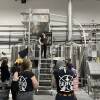As this year's BIO International Convention kicked off in Boston Monday, Mayor Michelle Wu unveiled an initiative aimed at bringing a thousand Boston residents from underrepresented groups into the biotech industry in the next two and a half years.
At the outset, the program will provide $4 million in grants to yet-to-be determined training programs, drawn from the city's Neighborhood Jobs Trust and federal funding already secured through the American Rescue Plan Act. Preference will be given to programs that show they've received internship and hiring commitments from local companies and focus on trainees without four-year degrees, including immigrants, people of color, and women.
"We know that in the years ahead, the regional life sciences industry will need thousands of new workers [as] they continue to grow right here in Boston," Wu said during a press conference in the lobby of the Boston Convention and Exhibition Center. "And as the world's leading life-sciences hub, Boston must be prepared to meet that demand by drawing on the talent that lives right here in our city today."
The initial round of grants will also be used to create what Wu called an "intermediary organization" aimed at providing support to Bostonians from underrepresented backgrounds who pursue careers in biotech, including child care and transportation.
More Politics
Wu unveiled the campaign in a press conference in the front lobby of the Boston Convention and Exhibition Center, as thousands of attendees streamed in for the BIO International Convention's first day. She was joined by several other stakeholders with an interest in reshaping the contours of the local biotech industry, including Vertex Pharmeceuticals President and CEO Reshma Kewalramani, Massachusetts Secretary of Labor and Workforce Development Lauren Jones, and MassBio President and CEO Kendalle Burlin O'Connell, who said Boston's new push reflects principles the industry ought to embrace.
"It's about making sure that our workforce represents the patient population that we serve," O'Connell said.
"We all want to make sure that Massachusetts stays the best place in the world for life sciences," she added. "We want to make sure that the innovation that happens here can positively impact patients, sick people, around the globe. And we want to make sure that every person who wants to work in a career in the life sciences has that opportunity."
While diversity and increased representation have been hallmarks of Wu's vision for Boston, launching this particular campaign in the midst of an international biotech conference was also an artful exercise in city branding, something Wu seemed to acknowledge directly early in her remarks.
"We are so proud to host this global event," Wu said. "It's a powerful statement to kick off this week focusing on our local workforce."
In addition to the grant-funded workforce initiative, Wu also announced the launch of a promotional campaign aimed at increasing awareness of biotech careers in Boston's neighborhoods.
After the event, a city spokesperson stressed that the $4 million in grant funds announced by Wu is an initial investment, and said the city plans to provide "significantly more" in the future.








